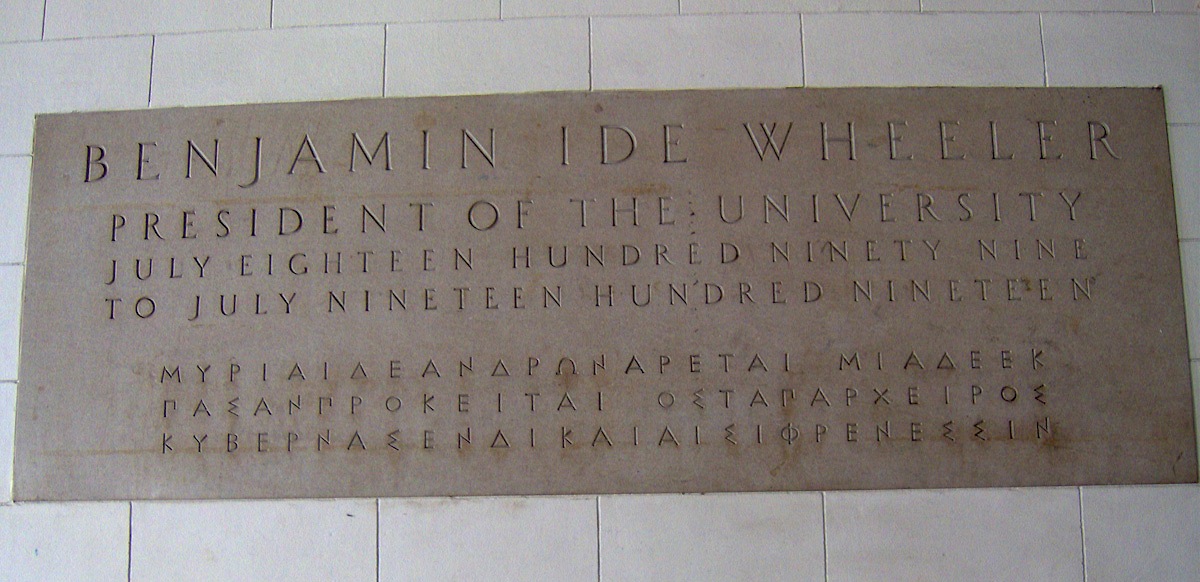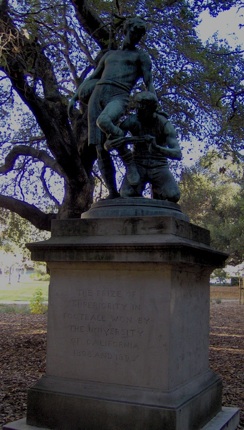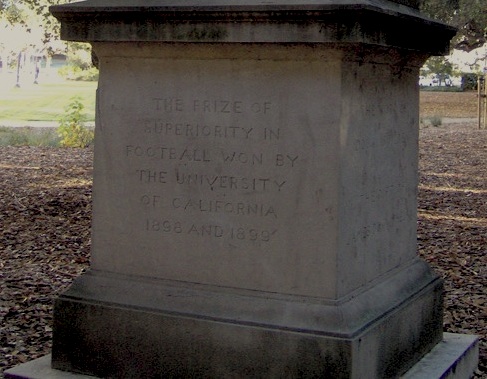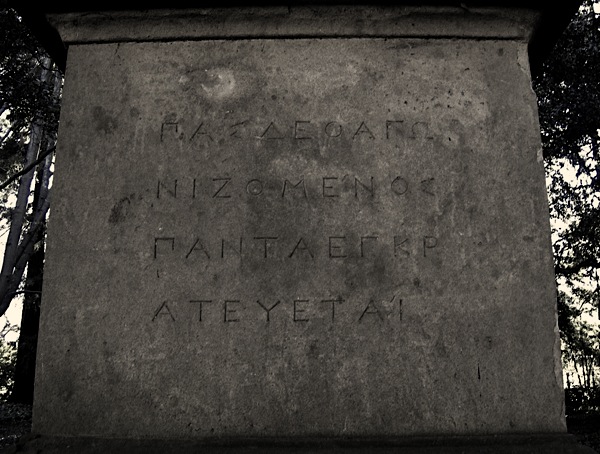

The ancient Greek alphabet has an abundant presence on the Berkeley campus. It is of course found in thousands of printed books dating from the late 15th century to the present day that are owned by The Bancroft Library, the Main Library, and by individual professors and students; there is also one Greek manuscript of the 16th century at The Bancroft. A more public presence is afforded by two outdoor inscriptions from the 20th century. Less visible are the inscribed words on a few of the plaster casts of ancient sculptures and stelae that are currently in storage off campus. Other modern reflections of ancient objects are the squeezes and photographs of Greek inscriptions at the Aleshire Center for the Study of Greek Epigraphy. Genuinely ancient objects also provide examples. Inscribed Greek script is also to be found on ancient coins (owned by the Phoebe Apperson Hearst Museum of Anthropology and by the Department of Classics), on a wooden school tablet and on ancient vases at the Hearst Museum, and on papyri curated at the Center for the Tebtunis Papyri.
Wheeler Hall is one of the classically-inspired Beaux-Arts buildings designed for the central campus by John Galen Howard. It is named in honor of Benjamin Ide Wheeler, President of the University from 1899 to 1919, who oversaw a major expansion of the campus and of its ambitions to distinction as a comprehensive research university. The dedicatory inscription is located on the west wall of the main lobby, outside Wheeler Auditorium. The text chosen is from the poet Bakchylides of Keos (5th century BCE), parts of whose works were restored to modern readers and scholars by the discovery of a large papyrus in Egypt in the late 19th century.


The quoted lines are from the 14th Epinician, of which the papyrus provides only the first 23 lines. The poem was written for a Thessalian named Kleoptolemos, who won a victory in horse-racing at the games in honor of Poseidon held at Petra in Thessaly.
The lines are inscribed in letter forms imitating those used in Athens from the late 5th century into the 4th century. They may be transcribed as follows in the capital letters of present-day Greek fonts:
ΜΥΡΙΑΙΔΕΑΝΔΡΩΝΑΡΕΤΑΙ ΜΙΑΔΕΕΚ
ΠΑΣΑΝΠΡΟΚΕΙΤΑΙ ΟΣΤΑΠΑΡΧΕΙΡΟΣ
ΚΥΒΕΡΝΑΣΕΝΔΙΚΑΙΑΙΣΙΦΡΕΝΕΣΣΙΝ
These lines are presented in modern texts as follows, forming lines 8-11 of the poem:
μυρίαι δ’ ἀνδρῶν ἀρεταί, μία δ’ ἐκ πα-
σᾶν πρόκειται,
ὃς τὰ πὰρ χειρὸς κυβέρνα-
σεν δικαίαισι φρένεσσιν.
In English they are rendered:
There are countless excellences of men, but one stands out before all the rest—when a man governs the matters at hand with just mind.
Under the trees by Campanile Way, directly south of Life Sciences Addition and west of the Dwinelle parking lot, is an 1893 work of Douglas Tilden, a Californian sculptor trained in Paris.

It was purchased by Mayor James Phelan of San Francisco and offered in 1898 as a prize to the first team to win two consecutive Big Games. After a series of losses to and ties with Stanford from 1892 on, the Cal team finally won a Big Game in 1898 and repeated that success the next year to earn the statue for the campus. It was dedicated on May 12, 1900. (Click for more on Tilden or this statue.)

One side of the statue base bears a Greek inscription, again in lettering that imitates inscriptions of classical Athens:

Here is a transcription in the capital letters of present-day Greek fonts:
ΠΑΣΔΕΟΑΓΩ
ΝΙΖΟΜΕΝΟΣ
ΠΑΝΤΑΕΓΚΡ
ΑΤΕΥΕΤΑΙ
Or as we would see them in a modern printed text of St. Paul's First Corinthians 9.25:
πᾶς δὲ ὁ ἀγωνιζόμενος πάντα ἐγκρατεύεται
In English they may be rendered:
“Every man who engages in athletic competition practices self-control in all things.”
Or in the King James Version "And every man that striveth for the mastery is temperate in all things."